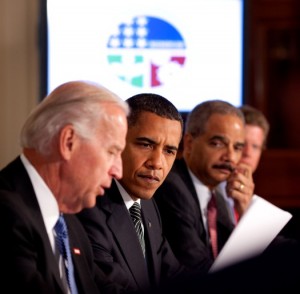Obama Admin. “Shows Contempt” for States, Federal Courts, Congress
 Today, Attorney General Eric Holder announced the federal government would recognize any same-sex marriage licenses that have been issued in Utah.
Today, Attorney General Eric Holder announced the federal government would recognize any same-sex marriage licenses that have been issued in Utah.
As you may be aware, a federal judge declared same-sex marriage legal in Utah last month, and the state was forced to begin issuing marriage licenses to same-sex couples in spite of the states ban on gay marriage. This week, however, the U.S. Supreme Court put a stay on the judge’s ruling until the matter can be appealed and decided by the Tenth Circuit Court of Appeals.
In keeping with the decision, the State of Utah has said it will not recognize the same-sex marriage licenses issued between the initial judge’s ruling and the Supreme Court decision. The Obama Administration, however, has unilaterally decided to ignore the Supreme Court, saying it will recognize the marriage licenses even though those licenses are not currently valid.
Family Research Council released a statement about the decision, which says in part,
“The Obama administration’s decision today is an effort to make law in the breach and shows contempt for the states, the federal courts, and Congress. It only adds to the administrative chaos by flouting Utah’s marriage law and is in contrast to the U.S. Supreme Court’s cautious approach in granting a stay in the case. The Department of Justice’s announcement is doing the very thing which the Supreme Court condemned in the U.S. vs. Windsor decision – ‘creating two contradictory marriage regimes within the same State.'”
Here’s the problem: There is no federal marriage license. Marriage licenses are issued by states, and the federal government defers to states in determining whether or not someone is lawfully married. That was actually a point the U.S. Supreme Court touched on last summer when it struck part of the federal Defense of Marriage Act.
If the U.S. Supreme Court says the State of Utah does not have to recognize same-sex marriage, and if the State of Utah says these couples are not lawfully married, then the federal government really has very little grounds for saying otherwise.
